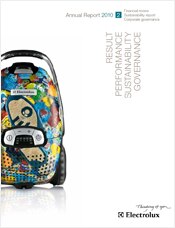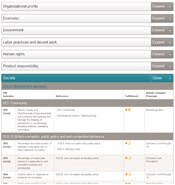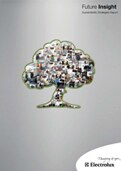Being transparent about how the Group measures, manages and integrates its sustainability priorities into its business is an important part of the annual reporting process.
Reporting focuses particularly on the four issues most relevant to the company, and is geared to the information needs of different stake-holders.
- Ethical and safe workplaces
- Climate challenge
- Responsible sourcing
- Restructuring
Electrolux is continuing efforts to address other issues of relevance to the appliance industry, such as producer responsibility for recycling and product responsibility asa well as the restriction and management of harzardous substances.
The company has developed a comprehensive, three-tiered approach to reporting on sustainability, including this extensive GRI report.

1. Annual report
Sustainability information is integrated throughout the printed Annual Report. Written for shareholders and stakeholders, six pages are additionally dedicated to how sustainability issues are relevant to the business strategy, as well as goals and performance. See also Annual Report Part 1, pages 56-59 and Part 2, p. 81-83.
2. On-line annual report
Built around a clickable GRI index, the sustainability performance review is integrated into the on-line Annual Report. It shows how Electrolux performs against recognized sustainability indicators in a broader context. It is designed for socially-responsible investors and other sustainability professionals.

3. Sustainability strategy report
Future InSight is an outlook report aimed at key audiences such as employees, retailers, customers and other business contacts. It is forward-looking, focusing on how environmental and social challenges are driving innovation and shaping strategies and partnerships. To be published in Q2, 2011.
Reporting realm
This report is based on the Global Reporting Initiative (GRI) framework and is in accordance with Application Level B, self-declared and GRI-checked to ensure the correct application of the GRI reporting framework. The GRI Index leads readers to reporting of each management approach and relevant indicator under the areas of Economic performance, Environment, Labor practices, Human rights, Product responsibility and Society. There is no applicable sector supplement for Electrolux.
Where relevant, this report also highlights how these priorities reflect the Group’s commitment to the ten principles of the UN Global Compact. Electrolux has therefore considered the newly-launched UN Global Compact "GC Advanced" level for reporting on its Communication on Progress through this report. When applicable, the last column of this GRI Index indicates where readers can find how Electrolux meets, or plans to meet, best practice levels for 23 criteria for reporting as defined by the UN Global Compact. Criterion 24, in regards to independent verification, is not addressed in this report.
Unless otherwise indicated, standard disclosures include all operations that can potentially affect Group performance. Data has been collected over the 2010 calendar year. This GRI data, reporting 48,262 employees, encompasses majority-owned operations, or 50 factories, 33 warehouses and 38 offices in 16 countries, and representing 95% of the total number of employees. Staff working at facilities with less than 30 employees is not included in this compilation.
One factory, the St. Petersburg washing machine factory was closed during 2010. To compensate for changing structure, to improve quality of the indicators and to enable comparisons, data from previous years has been revised to reflect the curent structure of Electrolux. For example, corresponding data from 2005, the baseline year for the 2012 energy reduction target, was 52 factories, 17 warehouses and 25 offices. The number of employees increased by 2% during 2010.
Historical data have also been revised and restated for indicators EN3, EN5, EN16, EN18 and EN19. Energy reductions performance was calculated according to World Resources Institute (WRI). Electricity emissions factors were updated according to the 2010 data set as published by the International Energy Agency (IEA). As recommended in the UNGC criterion 23, wherever possible, Electrolux reports on its performance indicators covering the last five years.
The company's previous sustainability report was published in March, 2009.
External assurance
Third-party assurance of compliance with ISO14001 is conducted annually at all certified facilities. In addition, third-party assurance of compliance with the Code of Conduct is conducted within risk defined regions.
For more and continuously updated information on the Group's progress and performance in regards to sustainability issues, visit www.electrolux.com/sustainability.
Or contact:
Electrolux Sustainability Affairs
Henrik Sundström
Vice President of Sustainability Affairs
Tel: +46 (0) 8 738 60 00
E-mail: sustainability@electrolux.se

